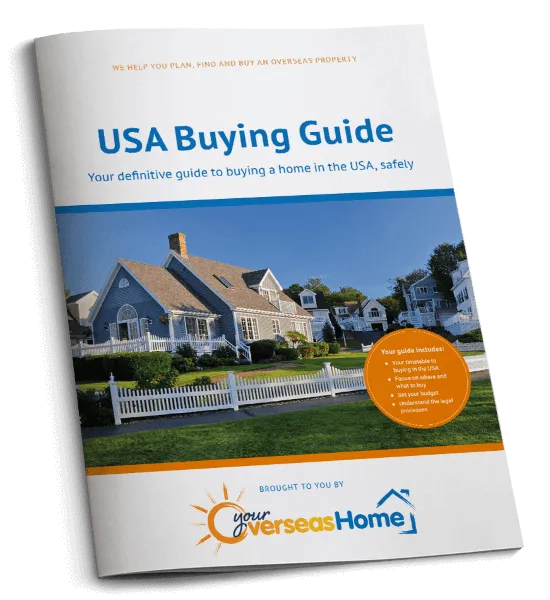If you’re looking to establish a little side-line in holiday rentals to see you through retirement, buying property in Florida could be the perfect way forward. But navigating the US holiday rentals market can be a little bit of a minefield. And the US taxman is not to be messed with! So today we’re explaining all you need to know about renting out your property in the USA.
Not only is the average price of property right now in Florida just $224,600 (£172,000) according to Zillow, but an incredible 116.5 million tourists visited The Sunshine State in 2017. That’s a whole lot of travellers looking for somewhere for them and their families to rest their weary heads after a long day at the beach or riding rollercoasters!
Find homes in the USA via our property portal.
It’s not just Florida that attracts the tourists. California, Texas, New York and Nevada all draw in huge numbers of visitors. But essentially, every US state has something different to offer. Therefore, as long as you choose a popular spot, you’re guaranteed plenty of people visiting town needing accommodation.

A private pool will keep renters happy
Essential first steps
Before you can start raking in that rental income, ensure your property is legally ready to receive guests…
1 – Conduct your research
If you’re looking to make the big bucks, you need to establish where the most popular locations are in your state of choice. There’s no point snapping up a property in the middle of nowhere just because it’s a bargain if the town only receives 10 visitors a year. In Florida for example, it makes sense to buy close to Disney and the other main attractions. Then you can attract tourist footfall and ensure your property has paying guests whenever you’re back in the UK.
2 – Are holiday rentals legal?
The rules for renting out property in the USA vary from state to state. Before you invest, make sure you are legally able to rent the property you have your eye on to holiday makers. For example, in Florida, Homeowner Association Laws apply. If you wish to rent a property, you need to become a member and abide by all of the outlined rules and regulations.
Depending on where your property is located, you may be restricted on whether you can rent or sublet your property. Moreover, there are heavy fines for breaking the rules. Your realtor will be the fountain of knowledge on this. Make sure they are aware of your intentions to buy a property in the USA to rent out when you’re back in the UK. That way, they’ll be able to direct your search to the right areas, the most desirable kinds of property, and will be able to offer guidance on the laws governing holiday lets in Florida.
If you’re investing in US property, read our guide, How to Negotiate Abroad, for insider tips and tricks on getting the best price.
3 – Get your licence
In most states, including Florida, you’ll need a license to rent out your US property. Securing this is relatively straight-forward. It simply involves an inspection to ensure the property complies with necessary safety laws surrounding matters like smoke alarms, security, swimming pool safety measures and so on. Bear in mind that you need to pay for this license. How much the license costs will depend on how big the property is and in what state it’s located.
4 – Holiday management company
Managing your holiday let in the US will prove very tricky if you’re back in Berkshire! We recommend employing a holiday lettings company to manage and care for your holiday let on your behalf. They will advertise your property (thus ensuring paying guests), manage the cleaning and general upkeep and deal with all guest liaison. Having a professional on the ground to deal with any issues is invaluable, especially when you’re a 13-hour plane ride away.
5 – Insurance
Before you welcome your first guests, make sure your US holiday let is insured against any damage. Additionally, make sure that your holiday lettings company take a security deposit from each guest to cover you for all breakages and damage. Guests aren’t as careful in holiday lets as they might be in their own homes!

A home with golf and lake views shoud be easy to rent
What taxes will you pay?
Tax on rental income in the USA
The Internal Revenue Service (IRS) states that non-residents must pay US income taxes on any income made within the United States. As long as you opt to have the property managed by a US property company, as mentioned above, rental income is subject to a 30% tax. As a non-resident, it is only rental income you will be taxed on.
Please note – the IRS are actually rather generous to foreign property investors, as long as you remember to file your tax return on time! It’s vital you elect the option on this form that allows you to offset expenses from your rental income. If you fail to select this option, you may find yourself unable to deduct everyday expenses like property taxes, repairs, depreciation and interest. This easily-avoidable mistake can have quite the impact on those profits you were hoping to rake in from your holiday let in the US.
Tax return deadlines
The US tax year is nice and easy to remember. It runs from 1 January to 31 December. You will need to lodge your individual income tax return with the IRS by the 15 April each year. You can do so online.
Being classified as tax resident in the USA
If you plan on owning a holiday let in the USA, but spending most of your time in the UK, you will only be liable to pay tax on rental income. However, you need to be careful with how much time you spend in the US. Ensure you don’t accidentally become considered resident for ALL tax purposes.
The rules for residency in the US are different for paying taxes than they are for any other purpose. There are two tests: the lawful residency test (whether you have a visa for the USA) and the physical presence test. If you pass either you are classed as a resident of the US for tax purposes.
Physical presence test
This test looks at how many days you physically spend present in the US. If you are in the US for 31 days or more of the current tax year, and a total of 183 days or more during the current AND the two preceding tax years – you are classed as ‘present’ in the US. Furthermore, if you are classed as having presence in the US, you will be ineligible for tax deductions and exclusions usually offered to those who have a primary residence in the UK, or another country.
These exclusions and deductions are key for British expats who want to avoid double taxation. Therefore, if you, like most Brits, plan on living primarily in the UK, you must consult a tax expert who will help you to carefully calculate the number of days you are able to spend on US soil to ensure you avoid missing out on these deductions.
Find homes in the USA via our property portal.
Tax on foreign rental income in the UK
You will still have to complete a self-assessment form every year with the Inland Revenue declaring your foreign income from your US rental property or properties. Fortunately, there is a treaty in place between the UK and the USA which prevents you being taxed twice on the same rental income. In this situation, you will pay the tax in the USA, and receive a tax credit within the UK to ensure you don’t have to pay tax twice on the same income.
Your first step will be to you secure a certificate of residence from HMRC to state that you are resident in the UK. Secondly, consult a tax expert to ensure you are taking the right steps to protect yourself. Tax is an intricate business. Each person’s tax responsibilities vary depending on where they have assets, where they earn income and so on. To ensure you’re not taxed twice or pay over the odds, consult an expert to get all of your tax ducks are in a row.
US Estate tax
In the USA, when a person who owns US property dies, they are charged a rate of 46% tax on the value of their estate. If you’re an American citizen, this only applies to the wealthiest echelons of society. Estates are exempt up to the value of $11.2 million. However, foreign buyers are only exempt from this tax up to the value of $60,000 (£46,000). Therefore, if you haven’t prepared for this – your loved ones could miss out on inheriting what is rightfully theirs.
Fortunately, it is easy to avoid this tax with a little forward planning. The easiest option is to take out an insurance policy payable to the heirs to your estate to cover the tax when needed. Do discuss it with a tax expert before you buy US property, however. That way, you won’t be hit with any nasty surprises later down the line.
Transferring your money back to the UK
To ensure you get the most from the rental income you earn in the USA, as well as having a tax strategy in place, you need a currency strategy. Every time you transfer money between countries, the cash is at the mercy of the international currency exchange rates at that exact moment. Sometimes, this can work in your favour and you can get more than you expected in your bank account. Others, you can end up losing money due to volatile exchange rates.
Enlisting the services of a currency exchange specialist like Smart Currency Exchange, ensures you protect yourself and your transfers. They can help you to lock in exchange rates that you’re happy to trade at for up to one year – this way, you will know for sure the exact amount you can expect into your UK bank account every month. Don’t risk losing out on rental income that should be lining your pocket – click here to be put in touch with a currency expert from Smart Currency Exchange today











